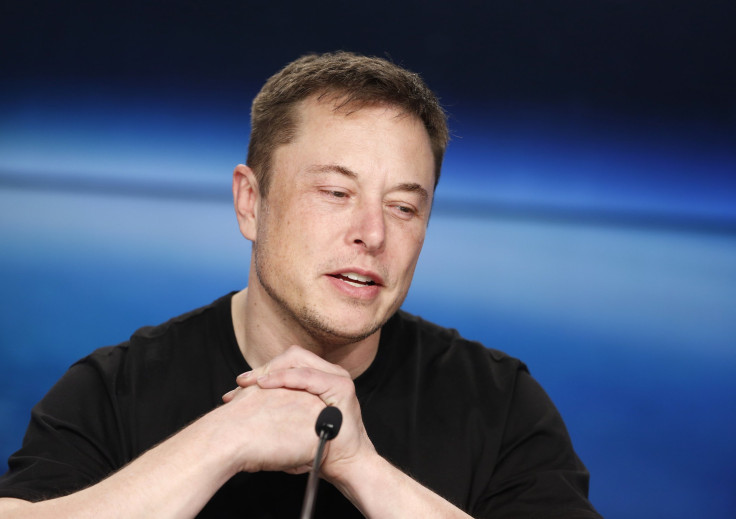The Price Of Musk Cutting Off Analysts? For Tesla, It's $2 billion

Ducking analysts' questions has a price: $2 billion.
Tesla Inc investors gave a rare rebuke to iconoclastic Chief Executive Elon Musk on Wednesday after he cut off analysts asking about profit potential, sending shares down 5 percent despite promises that production of the troubled Model 3 electric car was on track.
Tesla's future depends on the Model 3 and the company said it had largely overcome production bottlenecks, with Musk vowing a dramatic turnaround that would reverse losses and generate positive cash flow in just a few months.
Musk plans to shut down its Fremont, California, factory for 10 days in the second quarter but saidTesla will meet the production target of 5,000 Model 3s per day by the end of June, as planned, and will turn a profit in the second half of the year.
To achieve profitability, Musk will have to reverse what today amounts to a $22,584 pre-tax loss per vehicle built by the Silicon Valley company. Tesla posted its biggest-ever quarterly loss when it announced first-quarter results Wednesday.
Tesla stock was little changed after the earnings announcement but fell during a conference call, when Musk began cutting analysts' questions short, costing Tesla over $2 billion in market capitalization.
"These questions are so dry. They're killing me," Musk said after an analyst asked what percentage of Tesla 3 reservation holders have started to configure options for their cars, an indicator of how much profit Tesla will be able to wring from the vehicles. Another analyst asked about a capital requirement before being cut off.
He then took several questions in a row about plans for a self-driving car network and other long-term projects from the host of a YouTube channel focused on investing, praising the questions as not boring.
5,000 MODEL 3s PER WEEK
Musk's ability to run Tesla is crucial as the company strives to efficiently and profitably build its first vehicle intended to be produced at high volume, the Model 3.
Musk acknowledged error recently in over-automating the Model 3 assembly-line, which has resulted in production delays, but it is still unclear how long and costly it will be to unwind this mistake.
Delayed Model 3 production also comes as a slew of competitors bring new electric vehicle models to market.
The company stood by a previously announced target of building 5,000 Model 3s per week by the end of June.
Tesla's capital expenditures declined in the quarter and the company cut its spending forecasts for 2018, saying it would spend less than $3 billion. Tesla spent $3.4 billion in 2017.
Investing.com analyst Clement Thibault said the reduction was noteworthy, "but in the long run given challenges that lay ahead of Tesla, I don't think it is going to make or break the company."
Tesla "is definitely not in a minimizing cost stage," Thibault said.
Free cash flow, a key metric of financial health, widened to negative $1 billion in the first quarter from negative $277 million in the fourth quarter, excluding costs of systems for its solar business. Analysts had not expected so much spending, predicting hundreds of millions of dollars less in so-called cash burn, according to Thomson Reuters data.
Tesla did not break out a cash flow calculation it had included in previous quarters.
The niche carmaker, which two years ago vowed to build 500,000 vehicles annually in 2018, has attracted legions of fans for its advanced technology and design. But the company rushed its Model 3 to market, making mistakes in manufacturing whose effects are now being felt, and investor skepticism has risen.
Questions over Tesla's finances are top of mind, and many analysts anticipate a capital raise in 2018 despite Musk's statements it will not be necessary due to profitability and positive cash flow in the third or fourth quarters.
Tesla said gross margins on the Model 3, which today are slightly negative, would be close to flat in the second quarter and grow to "highly positive" in the second half of the year.
Tesla said it produced 2,270 Model 3s per week in the last week of April. It said net reservations for the Model 3, including configured orders not yet delivered, exceeded 450,000 at the end of the first quarter.
Automotive revenue rose only 1 percent from the prior quarter to $2.74 billion.
RECORD LOSS
Tesla reported a record loss of $709.6 million, or $4.19 per share, for the first quarter ended March 31, compared with a loss of $330.3 million, or $2.04 per share, a year earlier.
Excluding items, Tesla had a loss of $3.35 per share. Analysts had expected a loss of $3.58 per share, according to Thomson Reuters I/B/E/S.
The company said it ended the quarter with $3.2 billion in cash after spending $655.7 million in quarterly capital expenses.
The lack of Model 3 revenue has exacerbated Tesla's cash burn as the company continues to spend on its assembly line and prepares for new investments on multiple projects in the pipeline, such as the Model Y crossover and its Gigafactory.
The Model Y is just one of many projects in the pipeline for Tesla, which also launched a TeslaSemi and a new Roadster in recent months.
© Copyright Thomson Reuters 2024. All rights reserved.





















